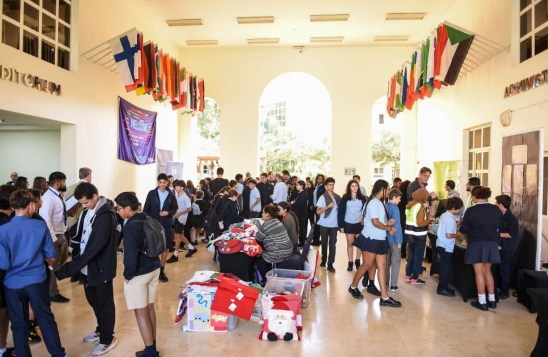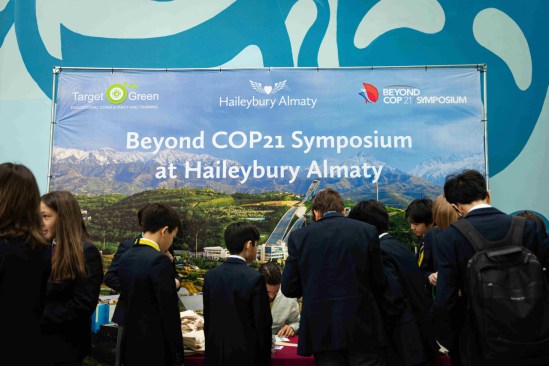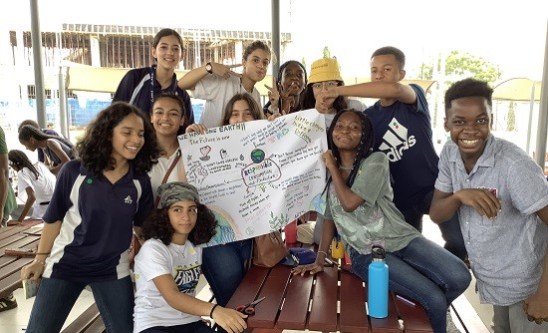Taking environmental education into the mainstream
Since 2016 climate educator Peter Milne has organised over 40 two-day climate conferences or symposiums for schools around the world under the banner of ‘Beyond COP21’.
We recently caught up with Pete to explore why he thinks COP21 – the UN Climate conference held in Paris in 2015 – is so important for schools to understand. But first we asked how he got into environmental education.
Eco work as a teacher
I qualified as a teacher way, way back. I was teaching for over probably 25 years altogether, initially in the UK, and then I decided I was fed up with the weather and ended up in Malaysia at St. Christopher’s, School in Penang under the stewardship of John Gwyn-Jones. It was a great place to start my career as in international teacher,
I was a primary class teacher, but I began to take on additional responsibilities such as environmental coordinator, science coordinator and creating residential trip programs. It was great just getting kids out to nature and learning about the environment. This became my passion, I guess.
The last school I actually worked at as a teacher was Raffles World Academy, which was one of the first schools in Dubai to come onto the Eco Schools Program. And it was the first school in Dubai that achieved a ‘Green Flag’. I was environmental coordinator there, and this aspect of my work just seemed to become more and more important.
Taking environmental thinking to ‘the next level’ is a real challenge at any school and by that I mean getting whole school engagement and community outreach and support going. At Raffles that became a focus. Just how do you get from having an eco-committee of very dedicated kids with one or two very dedicated teachers to involving the whole school with sustainability as one of its central concerns?
What I found in Dubai (and what seems to be the case everywhere) was that there were lots of organizations out there, but they were doing things in isolation. So, I organised an event at Raffles with a guest speaker, workshops, students and teachers from local schools and an exhibition. It was really a protype for the Beyond COP21 symposiums which I started to organise later, focused on the theme of climate change and sustainability.
Freelance eco-educator
I realized that I wanted to do this kind of work fulltime, left my teaching position and went freelance. What I hoped to do was to support those dedicated teachers in every school who wanted to do more for environmental education, but who had to place their subject or class teaching first.
I worked with a number of schools across the UAE, that just needed support and assistance to start them, running workshops for a number of age groups to try and bring the whole school together. My aim was to help them go beyond individual initiatives organised by their eco-committees and put sustainability at the centre of what their school does.
The first Beyond COP symposium in 2016
I did that for three years but I couldn’t maintain it just within the UAE, so that’s when I came back to the UK and set up my company, Target4Green. Not long afterwards, the first symposium took place in 2016 at what is now GEMS Legacy School in Dubai, and we called it “Beyond COP21”, a reference to the COP21 event that had just taken place in Paris. This was the 2015 United Nations Climate Change Conference.
Officially, it was the 21st “Conference of the Parties” – or countries – who signed the United Nations Framework Convention on Climate Change (UNFCCC), At these annual COP conferences, countries discuss how to address the problem of climate change. There had been twenty COPs before that, the first one being back in Berlin in 1995, but COP21 was the first time some kind of a universal agreement was put in place by world leaders to really tackle the challenge of climate change.
This agreement was to try and keep global warming within 1.5 degrees centigrade of world temperatures before the industrial period. It was ratified by the vast majority of the countries. Finally, action was being taken. It also made countries accountable for their own contribution.
A regular event on the international scene
Forty COPs have now taken place. The last one was in Kazakhstan at Haileybury College, Almaty, and there’s another five or six coming up, in New Zealand, at St. Christopher’s in Bahrain and further ones in India, Slovenia, Saudi Arabia and Egypt.
It’s been an awful amount of hard work, and COVID slowed things down, but it’s on a bit of a roll now. I think schools have realized the need to connect with each other and support their local communities.
The school symposium – an event and a catalyst

New Cairo British International School – NCBIS
The structure of the day is designed to make it as interactive and interesting for the students as possible. There has to be a host school and I work with them directly to put the whole event together. I aim to take the workload off the teachers because I know, having been a teacher myself, making the connections with schools and other organisations in their community takes so much time.
At the event itself, typically you’ve got a carousel set up for mixed groups of students aged 12 – 15 from different local schools who move around these different activities, workshops and visits to the exhibition. The exhibition is, I always think, the heart of the event, because that’s where the local solutions and the really passionate people are who want to engage directly with schools. Without something like the symposium, I think that’s sometimes difficult for them to do.
The symposium is designed to be a catalyst – to get a network going in a local area. The feedback I’ve had from schools is that they started something and they’ve carried on.
Dulwich College in London hosted a sustainability week that I was involved in, which included running a symposium and they’ve carried on the sustainability week every November since. It’s part of the calendar. The International Intercommunity School in Zurich also hosted me last year and they’ve carried that on, developing the structure of the symposium further and keeping the local school connections very strong.
One of the key ideas is that the students don’t just attend – they organise and work, Firstly, student ambassadors help to reach out to local organisations to get them involved. Secondly, at the event they look after ‘their’ contact groups chaperoning them, taking them behind the scenes and supporting them generally during the day. Thirdly, a number of student ambassadors run panel sessions or workshops.
Awareness, anxiety and inspiration
In the last few years I have seen a greater understanding of the issues and I think there are fewer students who are cynical about climate change. But I’ve also seen a growing eco-anxiety. There’s also a lot more concern from students about what’s happening. They don’t feel that there’s enough going on. They don’t feel the governments are doing enough, they don’t feel that schools necessarily are doing enough.

However, some of the students I work with are just the most inspiring students that you can name and you can see they are going to go on to do amazing things. At the recent event held at Haileybury-Almaty, you could see just how passionate they were. We had a couple of universities represented there whose young researchers were coming up with ideas in an entrepreneurial way, developing initiatives and solutions to what is a major issue in Almaty – air pollution.
It’s so important that teenagers see this happening.
I think what this kind of event helps with, is not only to give students that voice that they maybe have not had, but also to realize that there are so many people who feel the same way that they do and are doing something about it.
The importance of emotion and going mainstream

I run this activity where students can share their emotions about climate change, whether fear, grief, anger, hope, and how they see a liveable future. So they can just vent their feelings through pictures, through writing. And as you see all these images and all these feelings come on, the idea is that they realize that so many people feel the same way.
And that’s very empowering: It’s just up to us to give them a starting point.
We’ve got to make environmental education mainstream in schools very quickly if we are going to fulfil the ambitions of COP21 and meet our responsibilities to these young people.
 Peter Milne is the Founder/Director of Target4Green and is also the creator, organiser and facilitator of the Beyond COP21 Symposium series.
Peter Milne is the Founder/Director of Target4Green and is also the creator, organiser and facilitator of the Beyond COP21 Symposium series.
All images: contributed to Peter Milne

